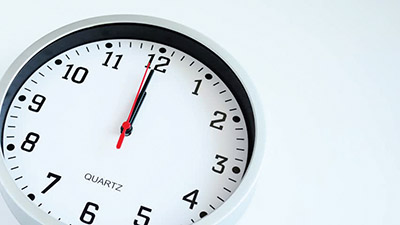
Tick tock, tick tock—that sound has been removed from most people’s lives with the influx of digital clocks and cellphones. The passage of time is now subtler, more quiet, but life’s clock does keep ticking. The question is: do we spend our life “killing time” with activities that don’t amount to anything, or do we use our minutes to reach for something higher?
Rav Paysach Krohn recounts the story of a chasidishe Rebbe in the early 1800s who stayed at an inn. All night long he heard the chiming of the clock in the hallway. He seemed very excited about this clock. He explained to the innkeeper that normally he hears the chiming and thinks to himself, “It’s closer now to the day of my death.” “But this time,” the Rebbe told him, “each chime made me think: it’s one hour closer to Mashiach!” Why the difference? The puzzle was solved when the innkeeper told him the clock years ago belonged to the holy Chozeh of Lublin. For sure, the Chozeh saw how time was precious and used each minute to its fullest.
The first mitzvah given to Bnei Yisrael was “Hachodesh Hazeh …” (Bo 12:1), that is, to sanctify the month by the sighting of the new moon. Why was this the first mitzvah given to Bnei Yisrael as a nation? Why is this mitzvah so crucial that it was given before leaving Egypt? Declaring the new month was absolutely necessary in order to enable the Bnei Yisrael to be redeemed, but why? The Seforno explains that a slave’s time is not his own; his time belongs to his master. Now that Bnei Yisrael were going free, time was going to be theirs to control and to use.
The Hebrew word “chodesh”—month—is spelled the same as the word “chadash”—new. The connection is simple: they convey the same concept. The period of a month represents renewal, as is seen in the phases of the moon, which starts off looking small, gets bigger, then smaller again.
Shlomo Hamelech says in Koheles, “Ein chadash tachas hashemesh”—there is nothing new under the sun. The Sfas Emes derives from here that “under the sun” there is nothing new; however, above the sun, there is something new. The sun represents nature. Under nature, there is nothing new, since everything is already set in motion. The mitzvah of kiddush hachodesh was the prerequisite for the Jews to become their own nation, klal Yisrael, because it split them off from the rest of the world, which counted by a solar calendar. The Jews would now count by a lunar calendar, which was a manifestation of a deeper difference. The Jews would now be associated with the moon—the concept of continual freshness and renewal. The Jewish people would now be above time.
Of course, such an ability can only be achieved by attaching oneself to something that is truly above time—Torah and Hashem. This was all granted to Bnei Yisrael with the mitzvah of kiddush hachodesh.
No one will deny the axiom that time is the most precious commodity we have. It is worth all the money in the world. However, the world we live in today does not value time. Insurance companies have fooled the American people to believe that when a person is dying, it’s better to die at home with limited medical attention than to spend thousands of dollars to maintain one’s life. Their underlying reasoning is that it’s just not worth it. True, it’s not worth it to them, because it costs them billions of dollars; but for the patient, isn’t every minute precious?
One of Pharaoh’s tactics was to increase the workload of klal Yisrael. The Ramchal explains that Pharaoh had a much deeper plan than just the back-breaking labor and impossible quotas. The total lack of time would prevent the Jews from contemplating their pitiful spiritual state and prevent the Jews from doing the teshuva they needed to connect with Hashem. This was the true nature of the enslavement of Pharaoh in Mitzrayim. Sadly, we are reliving it in so many ways. But Hashem already gifted us the ability to unlock our shackles. We can do so by dedicating ourselves even further to Hashem and His Torah.
The world says, “Time is money.” The Chofetz Chaim said it’s the other way around: “Money is time [i.e., buys us time].” But if the pursuit of money is taking away all of our time, then we have a problem. Let us find a balance so the uniquely Jewish aspect of time—sanctifying it for learning Torah and serving Hashem—is not forgotten in the hustle and bustle of life. Tick tock. Tick tock. Make each minute count!
By Rabbi Baruch Bodenheim
Rabbi Baruch Bodenheim is the associate rosh yeshiva of Passaic Torah Institute (PTI)/Yeshiva Ner Boruch. PTI has attracted people from all over northern New Jersey, including Teaneck, Bergenfield, Paramus, Rockaway and Fair Lawn. He initiated and continues to lead a full multi-level Gemara learning program in the evenings, gives Halacha and hashkafa shiurim on Shabbos and, more recently, has spread out beyond PTI to begin a weekly beis midrash program with in-depth chavrusa learning in both Livingston and Springfield.









